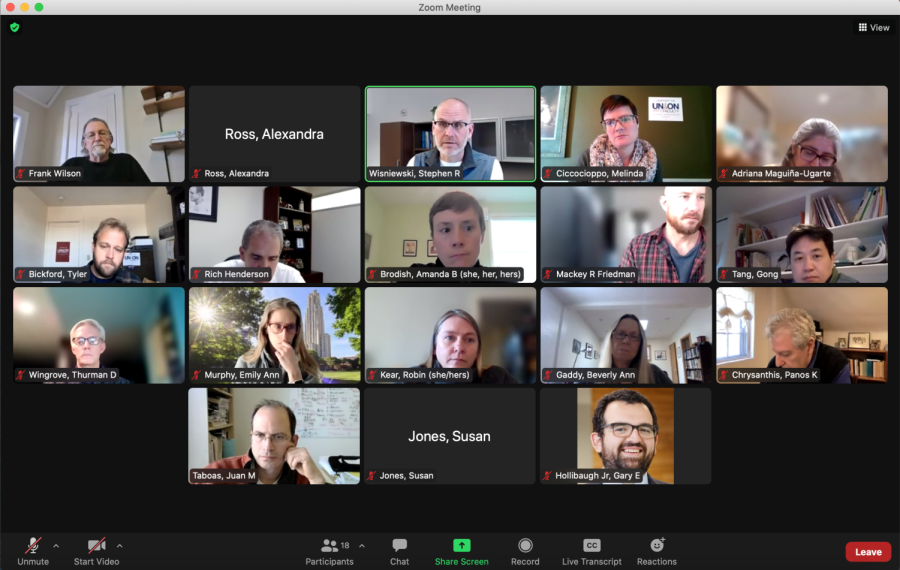Senate committee discusses salary appeals, vision for new budget model
The Senate Budget Policies Committee discussed Pitt’s salary appeals policy, Budget ReSTART and the role of Planning and Budgeting Committees under the University’s new budget model at Friday’s meeting.
January 23, 2022
The salary appeals policy is a frustrating process for many faculty members at Pitt, according to Beverly Gaddy, an associate professor of political science at Pitt’s Greensburg campus.
Gaddy said she appealed her salary unsuccessfully several times in the past decade, and took issue with the fact that she could only appeal to the person who made the original salary decision — the campus president.
“It was kind of an exercise in futility, but I went through it each time,” Gaddy said. “It was a pretty painful experience each time, to have to be humiliated in that way, to go to the person who made the decision to be told no again.”
Gaddy shared her experience at Friday’s Senate Budget Policies Committee meeting, the first of the spring semester. The committee, which met on Zoom, discussed the salary appeals policy and the role of Planning and Budgeting Committees under the University’s new budget model, Budget ReSTART.
Some members of the committee such as Panos Chrysanthis, professor of computer science, said they were under the impression that faculty could appeal to another individual — such as the provost — if their original appeal was denied. Stephen Wisniewski, vice provost for budget and analytics, said while each school has its own policies, the standard policy does not include appeals to anyone above a dean or campus president.
“We should not consider appeals to the provost part of the normal appeals process,” Wisniewski said. “I think the standard policy is that the deans or campus presidents are, in fact, the final word. And if there are appeals that get to the provost’s office, those would be kind of ad hoc and outside of the normal policy.”
The committee discussed potential solutions, such as creating a formal next step in the appeals process. Gaddy said she does not believe implementing an appeal further up the chain of command will create a more fair process of salary appeals. Instead, she said she would like to see a separate, neutral entity judging appeals.
“We talked about an appeal to the provost, but I’ve always held to the position that we needed to build not to the provost’s office, but that we need an appeal to a neutral body outside of a chain of command,” Gaddy said. “So either some kind of neutral committee made up of faculty and staff, or whatever. But outside of that line is the only real way to get a fair hearing.”
According to Tyler Bickford, an associate professor of English who chairs the committee, the October vote by faculty to unionize may influence their salary appeals process. But he said staff will still need a new policy, even if the union changes the process for faculty.
“This is very clearly directly impacted by the faculty voting to collectively bargain,” Bickford said. “But that will mean also that the policy itself, parts of the policy, will become moot or redundant, but then we still need a policy for non-faculty employees.”
The committee also discussed its vision for how Planning and Budgeting Committees will operate under Pitt’s new budget model, Budget ReSTART, which takes effect July 1. Budget ReSTART, which stands for Revenue Sharing To Accelerate Responsive Transformation, will decentralize budget authority by transferring it from the central University administration to individual schools.
Robin Kear, the Senate president and committee liaison, said the new model will require increased involvement of PBCs, and that the committee should begin strategizing and creating a vision for what the Planning and Budgeting System might look like come July.
“I think that thinking about the strength of the PBCs, looking at the structure of the planning and budget system, is very important for this group to do,” Kear said. “I really think that the key here is thinking about … the transparency that can come to the planning and budget committees for this to be successful.”
Some ideas proposed by the committee included training PBCs about their formal rights; training all faculty about the new budget model; creating guidelines for the constituencies represented in PBCs, possibly including students; creating a structure where PBCs can meet with one another and with Senate representatives; making sure PBCs are involved in making decisions; and establishing University-wide standards for how often PBCs should meet.
Juan Taboas, associate professor in the School of Dental Medicine and Swanson School of Engineering, said he believes it is crucial for PBCs to meet with one another.
“We saw this when we were on the Student Admissions, Aid and Affairs Committee, that the best practices don’t come out of the [Council of Deans]” Taboas said. “They’re not always talking about these things, and the grassroots, people getting together and making recommendations up the chain, really works. So if we have a formalized structure to get together, people will learn about best practices and make those recommendations back in their units.”
Kear and Bickford planned to reconvene before the committee’s February meeting to formalize ideas in written language and identify ideas that might not require a formal process and can be started earlier.
Bickford said he was glad Kear brought the subject of PBCs and the new budget model to the committee, and he thinks it is good for the committee to brainstorm its vision of a stronger system, even if those ideas may not be immediately actionable.
“Robin, thank you for stepping in and kind of giving us permission to move forward on this,” Bickford said. “Because I think it is good to at least be saying what we think this should look like, even if there are some additional steps.”



